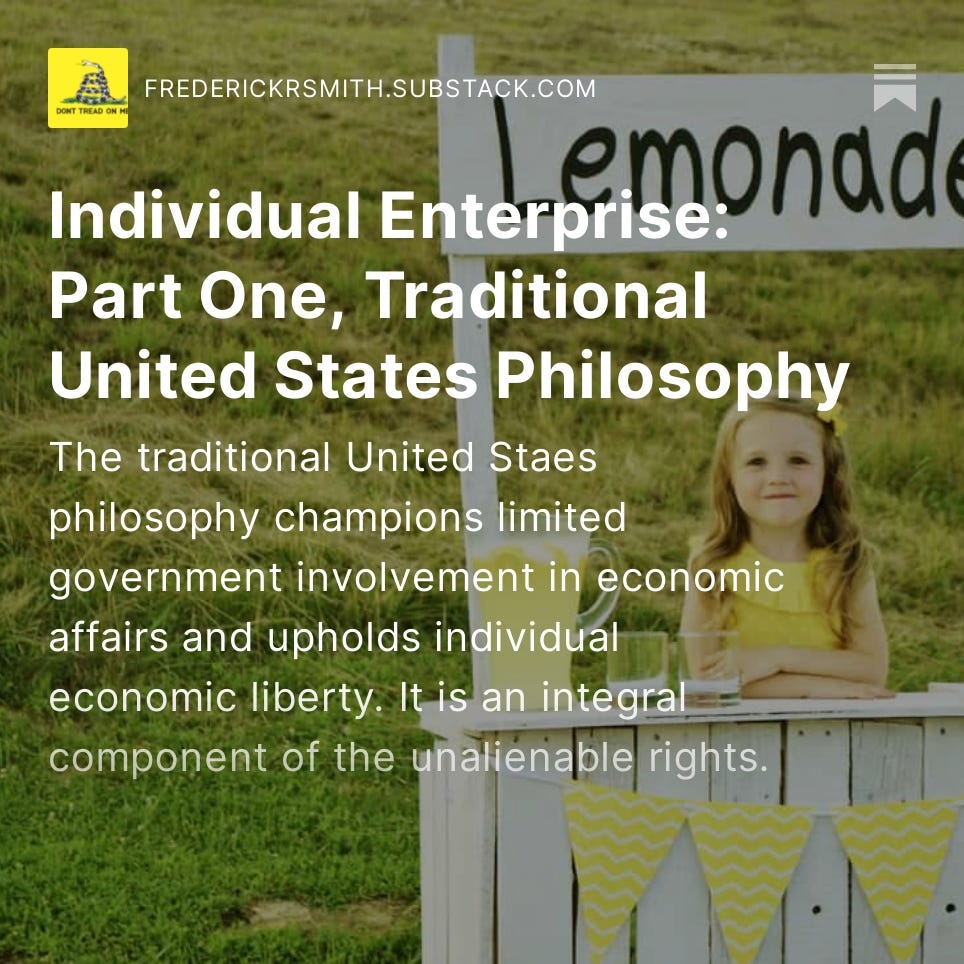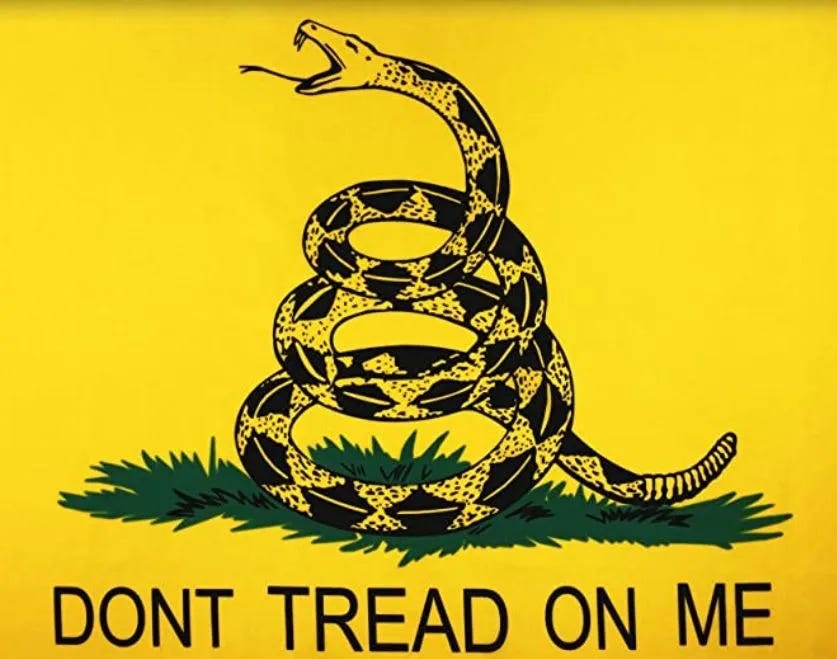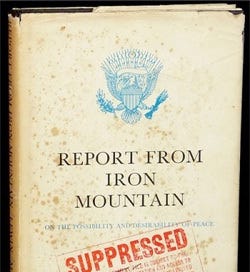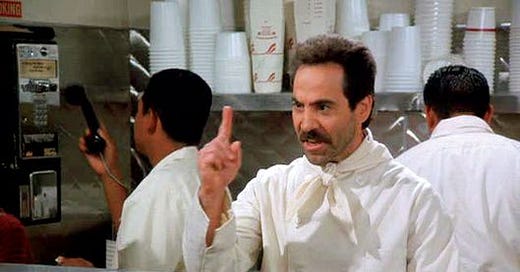

Discover more from Frederick R. Smith Speaks
Individual Enterprise: Part One, Traditional United States Philosophy
The traditional United Staes philosophy champions limited government involvement in economic affairs and upholds individual economic liberty. It is an integral component of the unalienable rights.
If you put the federal government in charge of the Sahara Desert, in 5 years there’d be a shortage of sand.
Milton Friedman
Foreword
Recently, a visit to the bank involved a meeting with a financial advisor. To discuss a personal financial concern, questions were raised regarding the potential consequences of Centralized Bank Digital Currency (CBDC) on our financial situation. Surprisingly, the banker professed ignorance about CBDC and responded with a somewhat sarcastic inquiry regarding the source of this information. It was then explained that the Biden administration issued a directive to explore the potential implementation of CBDC in the future. This news caught the banker off guard, leaving him somewhat startled.
The bank encounter made me think back to my teenage years. Earning money by shoveling snow, raking leaves, and mowing lawns was a joy. CBDC will likely end things like lemonade stands and other small businesses or sole proprietorships. Also, what might happen if CBDC blocks the tradition of giving to needy people on the streets? There is a notable absence of public outcry on this matter – a chorus of crickets.
Introduction
In the United States, traditionally, people believed in a government minimally involved in the economy. They also believe in being free to make economic decisions for themselves. It is an integral component of the unalienable rights outlined in the Declaration of Independence. This philosophy sees individual enterprise and the desire for private profit as essential parts of a free society. As we shall see, Thomas Jefferson and Benjamin Franklin were influential enterprise-orientated Founding Fathers. They believed in economic freedom without government interference. This approach supports human dignity and Liberty while fostering prosperity. It has ethical, moral, and social dimensions.
Philosophy of Individual Enterprise
Initially, the United States fostered limited government. It restricted the Federal government’s involvement in the economy. The government only controlled certain things in the Constitution, not people’s economic activities. That approach agrees with what the framers of the Constitution wanted in 1787. It also goes well with other parts of the philosophy, like ethics, morals, and society.
Individual Enterprise, in the traditional view, means individuals doing private economic activities. This philosophy and approach are solid. It covers ethics, morals, society, and other factors. This inclusivity extends to all components, including the concept of Individual Enterprise.
Men and women have a right to businesses and own property for personal gain. This economic Liberty is an inseparable and vital facet of the indivisible entirety of Individual Liberty. In 1801, Thomas Jefferson informed Congress about the importance of Indiual Enterprise. He noted that farming, making things, trading, and sailing can lead to prosperity. Based on traditional philosophy, this perspective holds for all economic aspects. According to Thomas Jefferson (1743-1826):
Agriculture, manufactures, commerce and navigation, the four pillars of our prosperity, are the most thriving when left most free to individual enterprise. Protection from casual embarrassments, however, may sometimes be seasonably interposed.1
Benjamin Franklin (1706-1790) expresses a similar viewpoint in his “Remarks on the Plan for Regulating the Indian Affairs.” Written circa 1766, Frankin asserts that government interference in setting prices contradicts the nature of commerce. He suggests that trade is best to find its rates without government intervention.
It seems contrary to the Nature of Commerce, for Government to interfere in the Prices of Commodities . . . It therefore seems to me, that Trade will best find and make its own Rates; and that Government cannot well interfere, unless it would take the whole Trade into its own hands (as in some Colonies it does), and manage it by its own Servants, at its own Risque.2
During the colonial period, the British government exerted comprehensive control over the empire’s economy, manipulating trade to its advantage at the colonies’ expense. The ethical, moral, and social implications of this economic Liberty, particularly the aspect involving Individual Enterprise and people’s Freedom within the economic realm, align with the traditional philosophy. In this context, several vital considerations emerge:
Economic interactions between individuals should be based on free choice, mutual agreements, and voluntary arrangements. This fosters mutually beneficial trade driven by rational self-interest while respecting each individual’s equal rights.
The private-profit motive within the Individual Enterprise system allows individuals to reap rewards for superior service or benefits, encouraging healthy competition. The resulting outstanding service contributes to societal well-being, influencing others to follow suit.
A conducive ethical environment is essential for economically maintaining men’s and women’s freedom. This environment arises from various positive influences, including religious, ethical, moral, and social factors and individual self-interest.
Ethical behavior fosters self-discipline among traders within the free market, preventing the need for government-imposed discipline. This contributes to a safeguard against excessive government over men/women.
Individuals often use Accumulated property constructively, supporting not only themselves and their dependents but also their unalienable rights. This encourages a climate that benefits the broader community.
The intertwining of rational self-interest and community service reflects the potency of the private-profit motive within an ethical environment, contributing to the higher aspects of life for individuals and society.
Rational self-interest within the private-profit motive aligns harmoniously with self-governance factors, forming critical elements of Individual Liberty-Responsibility.
Reflection of a Pencil
Milton Friedman (1912-2006) gave a famous talk about making a pencil. It provides a compelling illustration of the intricate web of cooperation and coordination that underlies even the simplest of human-made products. It underscores the precepts of traditional philosophy and Individual Enterprise.
In his 1980 video I, Pencil, Friedman explores the creation of a pencil. He shows how the market and individual incentives drive economic activity.3
Friedman starts by breaking down a pencil into its parts: wood, graphite, eraser, and metal. He then follows where they come from. He underscores that no individual possesses the knowledge or skill to create a pencil from scratch. Instead, many people with different skills work together to make a product. They cut down trees, mine graphite, and refine materials. Even though there are far distances and other languages, the participants work together well by using prices. Their self-interest drives them to produce and exchange goods.
Central to Friedman’s argument is the concept of voluntary exchange and the price mechanism. Prices serve as signals, telling producers and consumers about supply and demand. He illustrates this. Prices change, so people can choose, use resources well, and adjust to new situations. The market is self-regulating. Many interactions drive it, and it allocates resources to meet needs and desires.
Friedman uses a pencil metaphor to show how knowledge and incentives are essential. He emphasizes that only some individuals have the know-how to manufacture a pencil. The old market system allows people to use their unique skills and knowledge to produce goods. Incentives, like the chance to make money, motivate people to contribute and innovate, which helps the economy.
In his lesson, Friedman also questions the belief that a small group can coordinate production. He also challenges the idea of central planning. He believes that a simple pencil is too complicated for one person or group to control.
Analysis
With the above backdrop, today, multi-national corporations overshadow Individual Enterprise’s values. With monopolies and ownership of vast swaths of property and businesses, entities like Black Rock stifle rational self-interest within the private-profit motive. The fusion of big companies, Leviathan government, and non-government organizations had its seed planted by Alexander Hamilton (1755 or 1757-1804).
In the above clip from the fantastic HBO series John Adams, Hamilton takes Thomas Jefferson to school. With John Adams (1736-1826) listening, Hamilton claims, “The greater the debt, the greater the credit.” The idea against Individual Enterprise led to a central bank. This banking system became the cancerous Federal Reserve in 1913. Today, how we make money (out of thin air) in the United States lowers the value of our dollar and traditional philosophy.
Even though he wanted to work in a bank, Hamilton became a famous writer who supported the Revolutionary War without revealing his name. During the American Revolutionary War, he was an artillery officer. He participated in essential campaigns, supporting General George Washington (1732-1799). He played a vital role in the American victory at the Siege of Yorktown. After the war, Hamilton served as a representative for New York in Congress. He then left to become a lawyer and start the Bank of New York. Hamilton played a crucial role in the Annapolis Convention of 1786. The goal was to replace the Articles of Confederation with the U.S. Constitution. He wrote 51 out of 85 of The Federalist Papers, which helped promote the Constitution’s ratification.
While accomplished, as noted above, Hamilton left us a goose egg. For more, see the insightful essay Alexander Hamilton’s Curse by Frederick C. James.
Reflection
Lemonade stands symbolize the forefront of a collective effort to shape individual entrepreneurship. Moreover, it is the young entrepreneurs behind the pitcher of refreshing lemonade that they seek to influence nefariously. Specifically, gender-affirming “care” for youth (i.e., chemical and surgical mastication of reproductive body parts) is a top priority for the Bidnen Administration and its partner, the Democrats for Neutering Care (DNC). They have their backs in many ways.
Quite the way to share the wealth, ea?
Conclusion
In summary, the traditional U.S. philosophy believes in less government involvement in the economy. It also aims to promote ethical, moral, and social values. Economic freedom and individual Liberty rely on individual enterprise and the drive for profit. Although imperfect, like any human endeavor, many prefer this philosophy for its emphasis on personal Liberty and proven success.
Afterword
With a personal desire for Individual Enterprise, I hope you enjoyed this Frederick R. Smith Speaks installment. Stay tuned for this two-part essay’s next and final installment: Individual Enterprise: Part Two, Distributionism. 📕
Recommend Reading & Inspiration
The American Ideal of 1776: The twelve basic American principles ~ Hamilton Abert Long, 398 pages, Your Heritage Books, January 1976
Alexander Hamilton ~ Ron Chernow, 818 pages, The Penguin Press, April 2004
Friedman on “I, Pencil” & the Invisible Hand ~ Online Library of Liberty
I warmly encourage you to consider becoming a paid subscriber if you have the means. Regardless of your choice, your support is deeply appreciated. From the bottom of my heart, thank you for your invaluable support!
Thomas Jefferson on Politics & Government ~ University of Virginia Libary online
Remarks on the Plan for Regulating the Indian Affairs ~ cited by The American Ideal of 1776: The twelve basic American principles, pg 210
Friedman based his video on the essay by Leonard E. Read, I, Pencil My Family Tree as told to Leonard E. Read, Dec. 1958


















You had me at "If you put the federal government in charge". Excellent work.
"A government that governs lest, governs best"
" The government is like a dragon, the more you feed it, the bigger it gets. It will never get smaller"